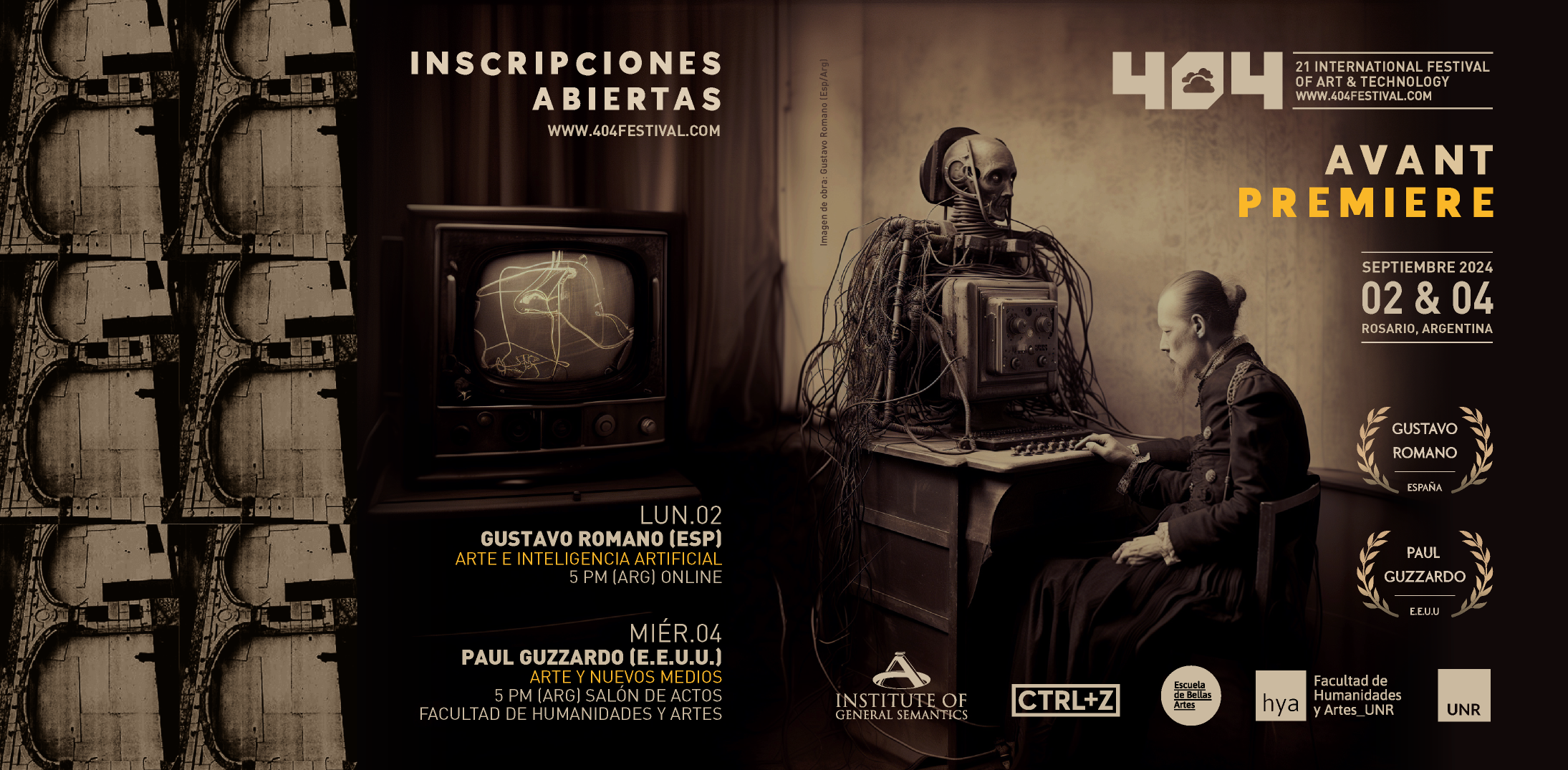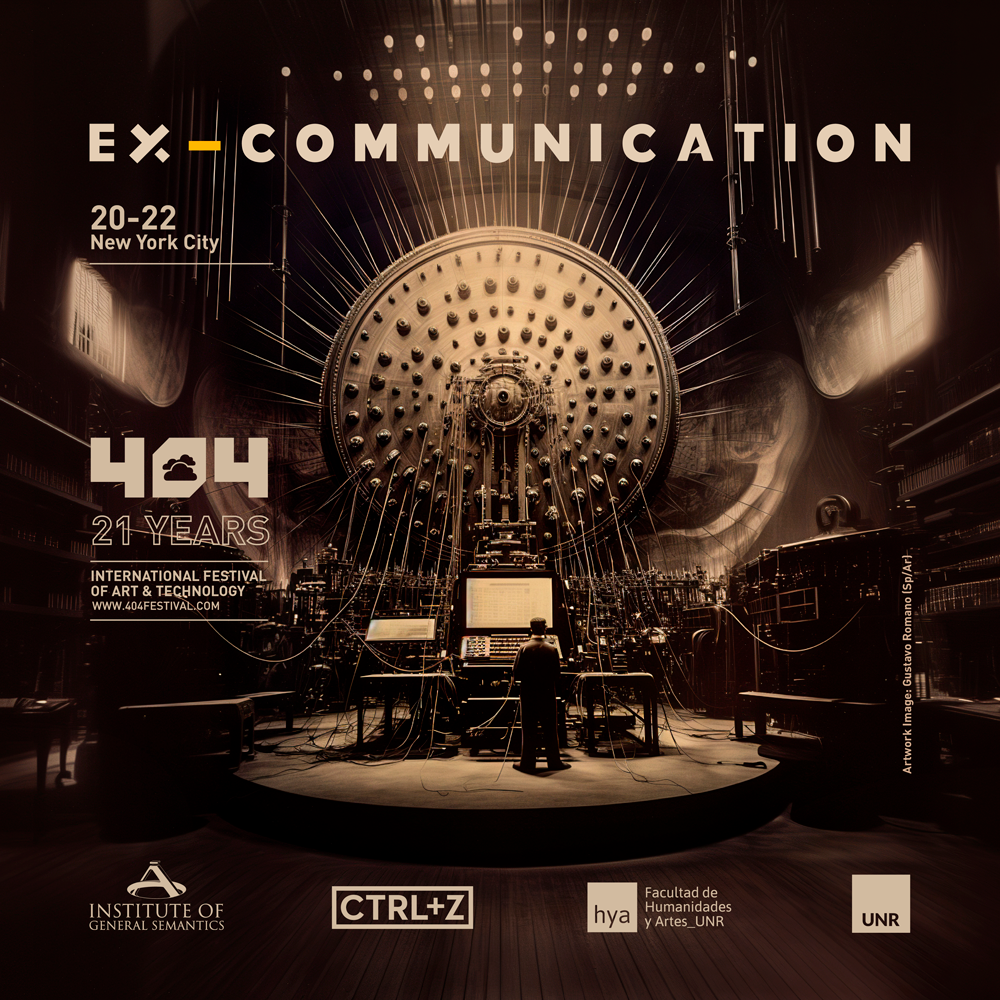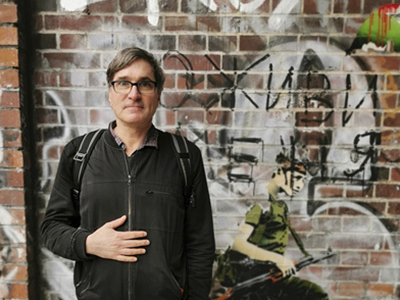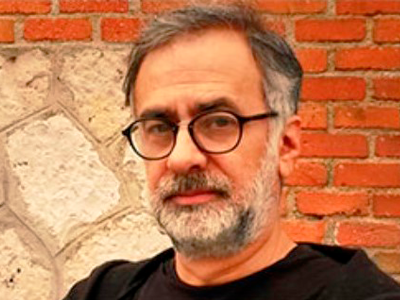
- EX-COMMUNICATION 2024
- EDITIONS
- 20th ANNIVERSARY 2023
- 19th EDITION / DIDASCALIA 2022
- 18th EDITION / HUMACHINITY 2021
- 17th EDITION / MEDIADEMIC 2020
- 16th EDITION / USA 2019
- 15th EDITION / JAPAN 2018
- 14th EDITION / ARGENTINA 2017
- 13th EDITION / COLOMBIA 2016
- 12th EDITION / ARGENTINA 2015
- 11th EDITION / RUSSIA 2014
- 10th EDITION / ARGENTINA 2013
- 2004 – 2012
- MANIFESTOS
- WHO WE ARE
- PARTNERS
- Language:


21th 404 International Festival of Art & Technology / Ex-Communication 2024
The “404 International Festival of Art and Technology” celebrates its 21st edition in New York City, under the title “Ex-Communication”. This edition brings together artists, professors and researchers who will offer talks on art, new technologies and communication.
This edition will take place in Manhattan from September 20 to 22, 2024, at the historic The Players Club within the framework of the 72nd Alfred Korzybski Commemorative Conference and Symposium on Communication, organized by the Institute of General Semantics.
Full Schedule here
Artwork image: Gustavo Romano
AVANT PREMIERE

ARTISTS 2024
Matt Kenyon
JEAN PHILIPPE COTE
David Clark
Lance Strate
Smomid
Lance Winn
Gina Valenti
Gustavo Romano
Manifesto Ex – Communication
Even though Excommunication has religious connotations, the dash in the middle allows a second meaning that, in this case, I will use to refer to the fact that we are talking about the present in terms of the past, and that technological obsolescence is transferred, though more imperceptibly, to the field of communication. When we talk about obsolete technologies, we rarely think of communication as a part of death.
When I was little, I couldn’t bear the ringing of the telephone, since we were called to tell us that my grandfather died, and since my father used to get the date wrong to wish me a happy birthday. When I stopped being so little, Dial-Up technology arrived, and because of it, we had to choose between phone calling or connecting to the Internet. You can imagine which one I chose. Now, I find myself living in a convergence of both. My mobile phone is constantly on silent. But if I don’t reply for a couple of hours, people may think that something bad happened to me.
I care about sound because it can become music when you least expect it. We live within alarms, sounds that some use to wake up and others to pick up a phone call or to decline it. Who hasn’t heard the sound of their alarm clock while they’re waiting in a queue, and someone picks up that phone call? In that sense, time is better, because it wakes us up in its own way, with nothing to say.
This is how I’ve walked through technologies all these years. I’ve seen them appear, be worshiped, and discarded. I’ve seen them die, without them even realizing it.
Technologies die before we do, and they do it progressively. Every time this happens, certain communication habits also become extinct because they can’t find their place.
Before the cordless phone, we talked close to the walls. Can the memory of a hand still remember the weight of an old phone?
If we remember how our communication was in the 90’s, anyone could call us and ring our doorbell unannounced, which generated unexpected and genuine encounters. Now we manage our communication with others like if we’re a company. We mark our calendars, plan the content of our meetings, we define the goals for our itinerary, we notify and are notified. The corporate mechanisms moved to our personal life.
From the moment we offer our data, companies use that information, which used to be our property and now is being managed like a product. Now we are property of those products.
During my lectures, I discuss with my students about the topics that this Symposium addresses. All of them know what we’re talking about, and still, the exit seems to be far from our reach. Where is the world going when we close our tabs? Confusingly, we’re still looking for the strange shape that truth used to have.
Why is it more difficult now to talk with the living than with the dead?
If an AI is more efficient to answer our questions, it’s because the system succeeded in beheading our will to communicate. A bot is programmed to reply, we’re as well, but we live in a world where our answers can’t find a meaning and our convictions can’t find their place.
There’s another type of relationship with intimacy since we started to live among devices and screens. A need that was filled with emptiness, hobbies and entertainment. Something took over the empathy we used to address others. Fictions seem to be our new mates, and bots, our allies.
There are people who fall in love with a bot because it could never disappoint them. It looks like the time of illusions is over. The times of war and love, too. Before, wars were atrocious because we suffered their losses. Now, wars are constant and invisible, we don’t perceive them. The battlefields simulate being countries, but everything razes inside us. And love was narrated in the same way so many times that failure defeated fiction, devouring everything.
What was once in the hands of the occult and religion today is a territory taken by AI: how to talk with a loved one who has passed away.
If when we’re gone there are people who find solace in a technology like that, we must think about the implications of these practices (beyond the legal aspects), because not even death will belong to us. It’s a matter of time until one day we are face to face with a hologram, with a humanoid, who talks to us like our parents did, like our loves, our idols, or, even, our enemies.
Since our relationship with time has already been transformed through media, after we stayed orbiting the instantaneous, now our notions of finitude and perception of absence are also changing. When this becomes a common practice, there won’t be a place for faith anymore.
What will happen when there is no more absence? We have gotten used to the presence, the absence, and the telepresence. We’re facing the beginning of tele-absence. A new ritual practice, managed from a corporate point of view.
We have been left outside of communication. Dead for what is dead. Living excuses for our replacement. It is time to ask ourselves if, in the end, we were language, and if we still are.
In the face of the idea that the dead belong to us, now we can take away their right to leave us. The artificial has imposed its conditions on what is natural.
There is another nature on fire. We live among smoke clouds. Like in a fire, we can’t breathe or see properly. Natural disasters are part of an ecology where fires can be seen and measured. What is on fire inside of us is invisible and incalculable. The only thing we have left is what is real, and for that, we must go outside, without restraint and caution.
It has never been easier to access our conversations, since everything we communicate and how we do it is not even a mark, but rather information packs which are stored in the cloud. AI are trained like this, with the virtual leftovers of our reality. Later, those leftovers are what constitute us.
If we consider that our relationship with technology has displaced much of what used to connect us to other humans, then we can think that breaking that tie is as difficult as, or more difficult than ending any other relationship.
In university, I teach Art and Technology. I show my students inventions that are now obsolete, but that in their time changed the perception of space-time. If you go to a vintage shop, you will find a telegraph, which now can only be a collectible, but outside, in the street, you will see that the consequences of that dissociation are still walking.
This year, a group of my students is working on “infoxication”, and I suggested they carry out an experiment by not using any type of device for 24 hours. To my surprise, they were glad. They thought the proposal was unheard of and, therefore, fun. For months, they tried to carry out the experiment until recently they managed to do it. So much anxiety and worry about how to live in a world without that other world. After all, messages and news are not the only things on a phone. Like a child would say, inside of a mobile phone there are people.
It is not a mystery that the new technologies feed off our communication crumbs. It is not a secret that the data we hand over for free reaffirm the economic and political status of the concentrated power groups. However, we still can’t find a genuine reason to cut our ties with what influences us, uses us, and keeps a close watch on us.
Maybe we are accepting new ways of combating the uncertainty that makes us humans. It is a curious invention, the concept of omnipresence which has followed us in different ways for so many centuries. The first technology that we invented to survive had to compensate for our most fundamental fear: the feeling of the being who exists alone.
Maybe one day we will find, much to our surprise, that what is new is not really what appeared later. Being human will always be a novelty.
To conclude, I want to share my thoughts about what we are living in my homeland.
My country has been taken by the wolf. But he hasn’t taken it without being seen. He has taken it without being interrupted. Argentina is now in an experimental phase, rehearsing a way of incorporating disaster into every aspect of our daily lives.
The only one who can defeat the people is the people, and God, they did. We face a new social pact where there is no longer a common consensus about what is fair.
What is unfair wouldn’t be the antithesis of what is fair, but a way in which what is fair is reprogrammed, it’s free from being fair. If we remember Magritte’s painting “The Treachery of Images”, in a world without any more pipes, that IS a pipe.
The end of categories doesn’t come when everything is the same to us, but when nothing can make itself recognizable. And this comes with the end of complaints, of rights, replacing critical thinking as a survival instinct, with hope and acceptance.
We are not in front of the end of categories, but in front of the gliding of the basis that have become fundamental so that social articulation doesn’t take us back to the Middle Ages.
My country has been taken by the wolf. And now, we will go and get him.
Manifesto 21th “404 International Festival of Art & Technology”
by Gina Valenti
2024
Argentina
Translation by Belén Nimo
 Español
Español














